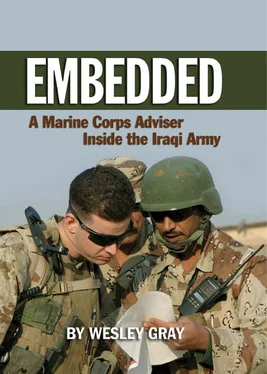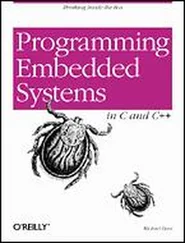I nodded in agreement and explained to Resgar that I agreed with his logic but felt for the young man’s safety. I came up with a compromise. I knew it would be impossible for me to shield the prisoners from the Iraqis; there were many of them and only one of me. Yet if I could convince the Iraqis this guy had given us all the information he knew, maybe the jundi would be less likely to be violent with him. “Listen Resgar, I have an idea, let me go in and talk to the prisoner.” Surprised, he responded, “You want to talk to him?” I said, “Yes, bring your electrocution prop and AK-47 into the room with me and follow my lead.”
I barged into the detainee’s room and yelled at the Iraqis to leave. I took the young man’s blindfold off, looked him in the eyes, and said, “As salama aleikum.” He responded in kind and swore he did not have any information. We continued to talk. He was surprised to see an American speaking Arabic. Through our conversation I learned the young man was in graduate school and had a family in the neighborhood. He even attempted to speak English in order to gain favor with me. As we talked Resgar fiddled with a small battery with exposed wires in the corner. He acted as though he was preparing an electrocution device. It was the ultimate “good cop-bad cop” interrogation routine.
I said to the detainee, “Listen man, I think you are an innocent man and I hope you have told me everything you know… but I am not sure. I am going to give you five minutes to tell me what you know. If you don’t I will let the Iraqis in here to do with you as they please. Please don’t let this happen. I need you to tell me everything you know—please.” The young man’s eyes widened and he screamed in English, “Mister, no! Please, mister!” He continued in Arabic, “Rah agullek kullshi, wallah!” (I will tell you everything, I swear to God!) I smiled and reengaged the frantic detainee. “Listen kid, I am going to leave the room for one minute to grab a glass of water for you. You look thirsty.”
In the one minute I stepped out to get a glass of water for the young man, Resgar played the bad guy. He blindfolded the detainee and said to him, “You better fuckin’ tell the American everything you know.” Resgar charged his AK-47 and pointed it at the kid’s chest. The detainee screeched, “Jamal, he is going to kill me. Help!” I knew Resgar was trying to scare the shit out of the kid and had no plans to kill him. We understood each other’s tactics without explaining them to each other. I sprinted into the room and yelled, “Get out of here, Resgar. If this kid doesn’t speak, I’ll let you have at him, but wait your turn.” I took the blindfold off the detainee and handed him a glass of water. “Are you ready to talk?” He was ready. Tears gushed from the poor kid’s eyes.
The detainee poured his guts out to me and Martin, whom I brought in for backup interpreter support. The guy told us everything he knew. He claimed to not be involved in the attack, knew those who were involved, and knew the location of an IED along Route Boardwalk one kilometer to the south of the WTF. His final piece of intelligence was a detailed description of one of the IED masterminds in Haditha who was responsible for numerous attacks.
At the end of the kid’s information dump, Martin got more aggressive. “You are an insurgent,” he insisted. “Don’t lie. I will kill you.” Thud. Martin head butted the detainee again. I pushed Martin to the floor and ordered him out of the room immediately. We were done at this point. I was willing to play mind games with the detainees, but my moral compass would not allow Martin to beat him senseless.
Dealing with the issue of torture for the first time in a real scenario made me think critically. I used to be in the “all torture is bad” camp, until I realized it would affect my survival. The issue is more complicated than simply saying torture is bad. This view is unrealistic and gets people killed. The argument I hate most is when people say torture is bad because there is a set standard of “ethics” in war. Wait a minute. War, at its heart, is about killing people until they agree with your viewpoint. Each side always has a different view of what is ethical and each side always thinks the other side is completely wrong.
To Iraqis torture techniques are a common sense approach to getting information. Iraqis feel that with torture they can ensure the prisoner will tell them everything they know and everything they want to hear. The positive aspect of this approach is you know you have exhausted the detainee’s information; however, the negative side to this approach (and an argument Americans frequently cite) is that the interrogator now has to disentangle the true information from the information that the prisoner gave because he wanted to hear it. The Iraqis believe that getting information is the hard part and disentangling it is easy. For Iraqis it logically follows that torture makes sense.
Before we deployed our MiTT had received no guidance or training on what to do in a situation in which the jundi wanted to torture a detainee. My approach was to let Iraqis do what they needed to do while explaining to them that beating people and torturing them may only lead to false information. This was simple idealism. The reality was that no matter how much wasta I attained, I would never change thousands of years of history and culture. Torture, in some form or another, is part of Iraq. Those who succeed in Iraq learn to deal with Iraqi culture; those who fail in Iraq try to change Iraqi culture. I wish officials in the highest levels of our government would realize this.
In this particular detainee case, it seemed like the Iraqi’s limited torture techniques worked, as we received outstanding information. We tried to get exact information, but reading maps is not a common skill in Iraq. Instead, the detainees gave us directions along the lines of “Go to the Hajji Mosque and turn a right at Abdul Azziz’s house. Once you reach his place, head to the place where we play soccer. This is where the IED is.” In the end the directions we received from the detainees were almost worthless. So instead we stopped by local homes to ask how to get to certain landmarks that they had mentioned.
Asking for directions from the locals ended up being fruitful. We had the chance to chat with the townspeople, hear their concerns, and learn about the local area. The stunning thing is that nearly every person in the village was either related to (or knew of ) the detainees we had captured. How word of their detention traveled so fast is a mystery.
After a sluggish two-kilometer move south, we made it to the Hajji Mosque. Finding a mosque is normally an easy task: look for the large minaret. However, the Hajji Mosque was unique, because a 500-pound MK-82 JDAM (joint direct attack munition) had destroyed the minaret during the initial stages of Operation Iraqi Freedom. The evidence that a mosque had ever existed was the rubble of the minaret and a village full of disenfranchised locals.
“As salama aleikum,” I said to a heavyset older woman cleaning off her porch with the help of her kids. The women approached me to chat. I asked her if she was familiar with the name of the detainee. She went into a tizzy. “Where is my son? What have you done with him? He is a good boy, a college student, he would not hurt a flower! Please, tell me he is okay!” I explained to the woman, “Your son is in good hands and we are ensuring the Iraqi soldiers do not kill or harm him. If your son is innocent he will be returned to you within seventy-two hours.”
The crying mother made me human again. This mother, who was as concerned about her son as my mom would be if I were in the same situation, touched me. She cried the same tears, asked the same questions, and professed the greatness and innocence of her child. I hoped she was right and her son was innocent. I am also thankful that I did not let the jundi go apeshit on her son. I would have felt like a real jerk if I told the woman her son was doing dandy but at the same time had watched the jundi beat him or electrocute him.
Читать дальше












